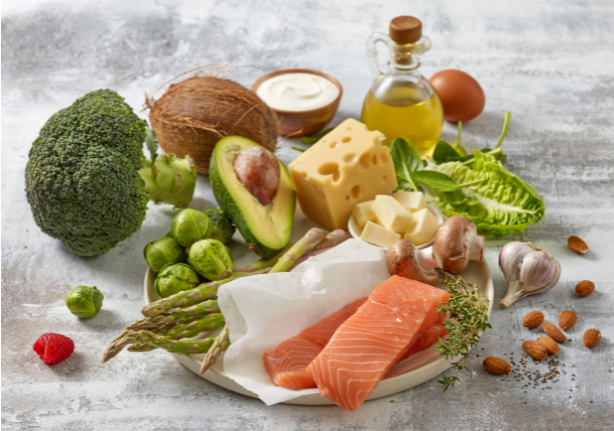What is a Keto Diet?
A Keto Diet, short for ketogenic diet, is basically a low carbohydrate high fat diet. This distorted distribution in macronutrients forces the body to switch the main energy source from carbohydrate to fat. When one consumes very little carbohydrates, the body will start breaking down and using fat as a main energy source which will result in weight loss. In people with type 2 diabetes, a Keto diet also leads to a reduction in blood sugar levels.

In what cases are Keto diets used?
Keto diets are used in the treatment of epilepsy, as they have been shown to reduce the frequency of seizures. In polycystic ovary syndrome (PCOS), as well, where a ketogenic diet has been shown to reduce insulin levels along with achieving weight loss. In Diabetes, both type 1 and type 2, a keto diet has demonstrated a reduction in blood sugar levels. A Keto diet is also used in the treatment of obesity, mainly because it supresses the appetite. Indeed, a Keto diet has been shown to supress the secretion of ghrelin, the hunger hormone, hence one feels more satiated.
What are the risks associated with following a Keto diet?
- Stress on the kidneys: A Keto diet puts stress on the kidneys because the urine will become more acidic, and this makes oxalate stones more likely. Also, a Keto diet may cause a decrease in the amount of citrate being secreted in the urine. Citrate is known to be a strong kidney stone inhibitor.
- Constipation: A Keto diet is very low in fibre which usually results in constipation. Eating enough fibre is important to gut health and keeping bowl movements regular. However, when following a Keto diet, the consumption of high fibre foods such as: whole grains, legumes, fruits and dried fruits is limited.
- Low blood sugar levels: Because a Keto diet is very low in carbohydrates the main energy fuel for the body, hypoglycaemia (low blood sugar) sometimes occurs when following this kind of meal plan.
- Nutrient deficiencies: Because a Keto diet is limited in carbohydrates, fruits and certain vegetables, this may put one at risk of developing certain nutrient deficiencies.
What are the foods included in the Keto diet?
The go to foods for Keto are: Eggs, cheese, fatty fish, poultry, meat, avocado, green leafy vegetables, capsicum, tomatoes, mushrooms nuts and seeds because they contain protein, some fat and no, or very limited amount of carbohydrates.
What are the foods excluded in the Keto diet?
Breads and baked goods, pasta, rice, legumes, potatoes, corn, juices and sugary drinks are foods you want to avoid when following a Keto diet because they mostly consist of carbohydrates.
What are the indications for a Keto diet?
A Keto diet can be used for a relatively short period of time to help in weight loss in specific cases of weight plateauing. It can also be combined with other habits and dietary modifications for optimum results; however, dietitians monitoring is recommended to ensure adequate nutrient intake, gradual and safe weight loss.
FAQ’s
Is a Keto diet suitable for me?
It is best you check with you dietitian to assess if a Keto diet is a plan you could benefit from.
Can I stop a Keto diet whenever I want?
No, stopping a Keto diet cold turkey may cause health problems such as electrolyte imbalance and rapid weight gain. It is best to consult with your dietician so that you can plan your exit from Keto diet safely to transition to a healthy eating pattern.

